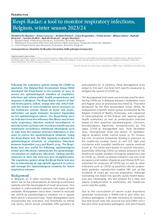Following the experience gained during the COVID-19 pandemic, the Belgian Risk Assessment Group (RAG) developed the Respi-Radar in the summer of 2023 to assess the epidemiological situation of respiratory infections and inform public health preparedness and response in Belgium. The Respi-Radar consists of four risk levels (green, yellow, orange and red), which indicate the extent of viral circulation and/or pressure on the healthcare system. Based on these risk levels, authorities can apply adequate measures depending on the epidemiological trends. The Respi-Radar uses six indicators from the influenza-like illness and severe acute respiratory infection sentinel surveillances in nursing homes, primary and secondary healthcare and wastewater surveillance. Additional information such as data from the national reference laboratory is also used to assess the epidemiological situation. Using the Respi-Radar tool, the RAG regularly evaluated the epidemiological situation of respiratory infections between September 2023 and March 2024. The Respi-Radar tool was useful for following epidemiological trends and effectively communicate the epidemiological situation of respiratory infections. Linking specific measures to each risk level was less straightforward. The experience gained using the Respi-Radar tool was key in determining an appropriate approach to assess and manage the epidemiological situation for future respiratory seasons.



